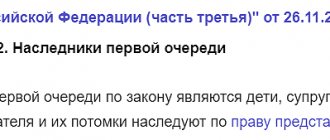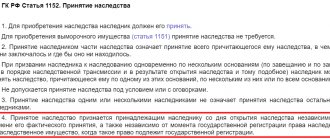Who is the unworthy heir?
An unscrupulous heir is a person who does not receive the right to inheritance after the death of the testator. The concept of an unworthy heir can be divided into several groups, each of which will include persons who have lost their right to inheritance for certain reasons. So, unworthy heirs include:
- Citizens who, by their actions, put pressure on the testator and thereby provoked an increase in their share in the inheritance or even forced the person to write a will and recognize himself as the main claimant to the property.
An example of this situation would be the death of a father, after which the children began to quarrel over his inheritance. At the same time, the daughter kills her brother, committing a crime against another successor. In fact, after this her share of the inheritance should have increased, but the court eliminates her right to receive the property of her deceased father, even though she is the first priority applicant.
- Unworthy heirs are citizens who, through their actions, caused physical injury to the testator or even provoked his death.
An example of this situation would be a fight in which a drunken son kills his father. The son committed a crime against the testator - his father, and this is a good reason for removing him from the inheritance. According to the law, the court will decide to recognize the son as unworthy of the inheritance.
- Persons who, by their actions, prevented the implementation of the last will of the deceased, and distorted the essence of the will, if any.
Example: before his death, a man left a will in which he transferred all property to his illegitimate son. The legitimate daughter, having learned about this, destroyed the will in order to receive the inheritance from her father in accordance with the law.
- Unfair heirs are also parents who are deprived of parental rights in relation to the deceased child - the testator. If a parent did not fulfill the responsibilities assigned to him in raising a child, then he has no rights to his property. This also includes fathers who have not paid child support during their lifetime.
It will be interesting to know that declaring an heir unworthy can also apply to people who claim an obligatory share in the inheritance. A person who, when submitting an application to a notary, concealed the presence of other heirs, may be accepted as unworthy.
The removal of the heir from his rights also entails the deprivation of the share and their descendants, that is, if the son is found unworthy of the inheritance, then his children - the grandchildren of the deceased, who could enter into the inheritance by right of representation - cannot claim the property of their grandfather.
Who can't inherit
According to Art. 1117 Civil Code of the Russian Federation:
1) Citizens who, by their deliberate illegal actions directed against the testator, any of his heirs or against the implementation of the last will of the testator, expressed in the will, contributed or tried to promote the vocation of themselves or other persons shall not inherit either by law or by will. to inheritance or contributed or attempted to promote an increase in the share of the inheritance due to them or other persons, if these circumstances are confirmed in court. However, citizens to whom the testator still bequeathed property after they lost the right to inherit have the right to inherit this property.
2) Parents do not inherit by law after children in respect of whom the parents were deprived of parental rights in court and were not restored to these rights by the day the inheritance was opened.
3) At the request of an interested person, the court excludes from inheritance according to the law citizens who have maliciously evaded the fulfillment of their obligations under the law to support the testator.
In other words, it turns out that the law clearly names cases when an heir can be excluded from inheritance, i.e. when he is an unworthy heir.
Conditionally unworthy heirs can be divided into 3 groups:
1) Heirs who committed intentional illegal actions against the testator, his heirs with the aim of calling them to inheritance, increasing their share
2) Heirs-parents deprived of parental rights (when inheriting after children)
3) Heirs who did not fulfill their obligations to support the testator (for example, children did not support their parents).
Please note that in each case a court decision is necessary (despite the fact that paragraph 2 of the said article does not say anything about it). Consequently, it turns out that in order to recognize a person as an unworthy heir, two conditions must be met in combination, one of which is confirmation of specific circumstances by a court decision. And this requirement is explained by the fact that the argument of the interested party for removing an unworthy heir from inheritance may be due to subjective factors that are far from the real state of affairs. An existing court decision confirming the existence of the circumstances specified in Art. 1117 of the Civil Code of the Russian Federation, there is no doubt about the legality of removing citizens from inheritance.
How to recognize a citizen as an unworthy heir?
The procedure for depriving an heir of an obligatory share of inheritance
The grounds for recognition as an unscrupulous heir are clearly described in the Civil Code. If you want to find one of the legitimate applicants unworthy, you need to prepare a lawsuit in court. If there is an unworthy heir in the family, a qualified lawyer or notary will tell you how to prove it, and he will also tell you how to correctly draw up an application for deprivation of inheritance rights. In addition to the application, you should collect a package of documents, which includes:
- receipt of payment of state duty;
- a copy of the application in triplicate;
- death certificate of the testator;
- documents confirming the status of the plaintiff (you must present documents confirming your relationship with the deceased person);
- proof that the heir evaded his obligations towards the testator, committed a crime against him or put pressure on the deceased person, as a result of which he distorted his last will.
The claim is filed at the place where the unscrupulous heir is registered. Within 7 days, the judge registers the application and sets a date for consideration of the case. If the claim is satisfied and it is possible to prove that the person is unworthy, then he is deprived of the inheritance. The court decision must subsequently be submitted to the notary who is handling the inheritance case.
It is very important to note the fact that people who inherit property under a will do not have the right to file an application to court to determine an unworthy successor. Only successors by law, that is, blood relatives, have the right to prove the unworthiness of one of the applicants for the property of the deceased.
Grounds for recognition as an unscrupulous heir
Under the Civil Code of the Russian Federation, unscrupulous heirs are deprived of all their rights to the testator’s property. The following may be considered legally unworthy:
- a person who intentionally committed a violation to increase his share;
- a citizen exerting unlawful influence, threats, pressure on the remaining heirs;
- a person who forged documents or stole them and tried to destroy them;
- a citizen who killed or inflicted beatings that caused the illness of the testator;
- other people, in accordance with the current provisions of the law.
Lawyers argue that only an heir who has committed any active actions can be considered dishonest. If the testator learned about the death of the testator, but did not notify the other claimants to the property, he does not fall into the category of unworthy.
How to disinherit an unscrupulous heir?
Today, only a court or the testator himself in his notarized will can recognize a person as unworthy of an inheritance.
Therefore, in order to assign a citizen the status of an unscrupulous citizen who has no rights to inheritance, the interested party must collect all the necessary documentary evidence and file a claim in court.
Documents for recognition as an unworthy heir
To go to court, a citizen or a person representing him must prepare a package of papers:
- claim to recognize the applicant for the testator's property as unworthy (three copies);
- a document confirming payment of the state duty;
- document on the death of the testator;
- documents confirming the heir’s dishonesty;
- copies of documents confirming the existence of rights to inheritance from interested parties.
After collecting all the necessary papers, a person can contact the judicial authorities located at the defendant’s place of residence.
The court cannot deprive persons who have the right to an obligatory share of the right to the testator’s property. Such people include disabled spouses, minor children, and other persons in need of financial support.
Sample claim for recognition as an unscrupulous heir
When applying to the judicial authorities, the applicant submits a corresponding application to recognize the person as unworthy and, as a consequence, to exclude him from receiving the inheritance.
The procedure for submitting a document presupposes the need to indicate the details of the court, the personal data of the applicant and the unworthy testator, an inventory of the testator’s property, claims and the date of drawing up the document.
If, by decision of the judicial authority, a person is recognized as dishonest and unworthy of inheritance, the plaintiff must contact the notary who deals with the will and provide him with the court verdict. Further, based on the principles of the Civil Code, the notary removes the unworthy citizen from the inheritance line.
How is property returned from unworthy heirs?
As the law says, property that was inherited by unworthy persons is considered their unjust enrichment. Based on the standards described in Articles 1104–1106 of the Civil Code of the Russian Federation, it must be returned to its rightful owners. That is, the unworthy successor is obliged to return in full the property that he inherited. If he has not yet received the right of inheritance, then his part is divided in equal shares among the remaining successors, and the right of ownership is given to the share of the unworthy.
If, as a result of illegal enrichment, things have lost their primary appearance, the violator must compensate for all the deterioration of things that occurred after he was found unworthy. If it is impossible to return the property, the receiver pays the cost of the property in cash.
If there was an entry into an inheritance where the subject of the inheritance was a business or some enterprise, then the unworthy owner must compensate the remaining recipients for all income from the possible use of the property.
The concept of unjust enrichment includes the provision that interest will accrue on the amount of unjust enrichment from the day the citizen is recognized as an unworthy recipient. Therefore, if a person evades paying compensation to other claimants for property, he will ultimately be brought to administrative and even criminal liability, and his current property will be seized.
How to issue a power of attorney to conduct an inheritance matter?
Consequences of unworthy status
After a citizen is recognized as an unworthy heir, he is deprived of all rights to the inherited property of the deceased. This cannot be avoided even if the given successor has the right to an obligatory share in the inheritance or if other heirs refuse the property.
If the heir is found unworthy, and the deceased has no other successors, then the property becomes escheated and transferred into the possession of the state.
It is worth noting that the consequences of unworthiness also apply to the descendants of the heir, that is, his children and grandchildren. They are also deprived of inheritance rights.
If the status of an unworthy successor is recognized, his name is simply excluded from the certificate of inheritance; no additional documents are drawn up.
Rules for drawing up a claim for recognition of an unworthy heir
Like any legal document, a claim to declare an heir unworthy has a clearly regulated structure. You can seek the help of a qualified notary or try to draw it up yourself. The application should be structured as follows:
- The name of the court where the case will be heard.
- Full name of the plaintiff.
- Full name of the defendant.
- Full name of the third party, usually a notary.
- Document's name.
- The main part of the document - here you indicate your first and last name, the degree of relationship with the deceased, your right of inheritance in turn, and the person who is considered unworthy is indicated. The subject of the inheritance is characterized and the reason for recognizing the citizen as unworthy is described.
- Evidence of the heir's guilt - this may be the number of the certificate of the court decision on the commission of a crime against the testator, the number of the document indicating the deprivation of parental rights or information from a notary who will confirm that the second citizen hid from him the presence of other claimants to the property or interfered with the execution of the last will deceased.
- Appeal to the court - begins with the word “I ask”, here you ask the court to recognize the citizen as unworthy of the inheritance.
- List of attached documents.
- List of witnesses who are involved in your case.
- Date of preparation of the document and signature of the plaintiff.
The document must not contain abbreviations, crossing out or corrections. The progress of the case directly depends on how correctly you draw up your claim. If irrefutable evidence of the guilt of one of the heirs against the testator is attached, your claim will be satisfied at the first hearing.
To summarize, I would like to say that if you do not want to encounter legal red tape in which your loved ones decide to deprive you of your legal right to the property of a deceased relative, try to maintain good relations not only with the testator during his lifetime, but also with relatives after his death.
How to disinherit an unworthy heir?
Declaring an heir unworthy is a strictly regulated procedure carried out in court. To make a positive decision on the case, the applicant must provide irrefutable evidence of the co-heir’s unworthy behavior.
Recognizing an heir as unworthy is possible in the form of several procedural documents, in particular:
- Sentences in criminal cases committed against the testator or co-heirs;
- Decrees on deprivation of parental rights;
- Decisions in civil cases on claims for invalidation of wills, gift agreements and other documents;
- Decisions to recognize heirs as unworthy.
They cannot be recognized as a basis for declaring the unworthiness of a decision on administrative offenses.
Deprivation of the right of inheritance through a notary
A notary must exclude a specific heir from receiving property on the basis of a court decision.
It is the notary who opens the inheritance case and distributes property between the heirs, and also issues them certificates of the right to inheritance.
This procedure occurs in several stages:
- A certified copy of a court decision or sentence that has entered into force is handed over to the notary. If the court proceedings have not yet been completed, it is required to submit an application to the notary to suspend inheritance actions for this period.
- Submitting an application to a notary to exclude a specific heir from inheritance. A statement is written in free form with a court document attached to it. The notary is obliged to register the application and issue a receipt of its receipt.
- The notary does not issue any special document confirming his exclusion from inheritance. The name of the unworthy heir is simply missing from the certificate of inheritance.
If the notary issues a certificate in which the unworthy heir appears as a worthy one, the co-heirs will be able to appeal the notary’s actions in court.
An appeal can take the form of filing a claim to invalidate the certificate or to recognize the property rights of an unworthy heir as absent.
To file a claim in court, a state fee of 300 rubles is required.
Deprivation of the right to inherit without a notary
How to recognize an heir as unworthy without the participation of a notary? In some cases, to confirm the fact of the unworthiness of one of the heirs, a notary decision is not required. Sometimes all these procedural issues are resolved on the spot by the court.
This is possible in two situations:
- When the division of the inheritance is carried out by the court along with the recognition of the heir as unworthy.
- When the court makes a decision on the unworthiness of the successor by the time the inheritance case is already closed and the certificate of inheritance has already been issued.
The second case is inevitable in a situation where the trial lasts longer than the inheritance case . At the same time, the notary is not notified by the heirs about this using an application to suspend the inheritance case.
As a result of such a story, it is necessary to again challenge the certificate issued by the notary in court.
How to prove unworthiness?
Going to court to demand that an heir be declared unworthy does not mean a high probability of a positive outcome. In order to achieve the removal of a particular heir from the fight for the inheritance, it is necessary to prove his unworthiness.
In the process of proof, attention should be paid to the following circumstances:
- If a criminal act is committed against the testator, it is necessary to prove the motive for the action, which is directly related to the receipt of the inheritance;
- In civil proceedings, it is necessary to prove the selfish purpose of the heir’s behavior, his receipt of potential benefits as a result of his actions and the loss of such benefits from other co-heirs;
- If the heir evades the testator's financial support, it is required to provide documentary evidence of the income of the unworthy heir and attempts to hide or reduce it.
In civil proceedings, several claims can be presented to the court, which can be satisfied by one court decision.
Therefore, before going to court, it is better to get advice from an experienced lawyer who could give advice on combining related claims in the content of the claim.
The procedure for returning a share previously received by an unworthy heir
What to do if, after the court decision, the inheritance case has already been completed? Situations such as we described above are not uncommon.
In this case, the same Article 1117 of the Civil Code of the Russian Federation contains a rule that an unworthy heir who has managed to accept the inheritance is obliged to return it back according to the rules on unjust enrichment.
This means that there will be no automatic return of the inheritance. Now you will need to file a claim for unjust enrichment.
Attention! To avoid such “double” legal proceedings, at the stage of consideration of a claim to declare an heir unworthy, it is recommended to monitor the status of inheritance cases. If you see that the inheritance case has already been completed, clarify the claims by supplementing them with a demand for the return of unjust enrichment in the amount of the excess share received.
If, at the time of filing a claim to deem an heir unworthy, it is already known that he has acquired inheritance rights a long time ago, it makes sense to immediately include demands for the return of unjust enrichment.
What if the share cannot be returned?
As a general rule, unjust enrichment must be returned in kind. The same applies to an unjustifiably acquired share in inherited property. What to do if the heir has already sold the apartment?
In this case, according to the rule of Article 1105 of the Civil Code of the Russian Federation, unjust enrichment must be returned in the form of money.
Note! From the point of view of evidence, this means that during the consideration of the claim it is necessary to declare a forensic examination to assess the share of the returned inheritance.
Interest is also subject to accrual on the amount of unjust enrichment under Art. 395 of the Civil Code of the Russian Federation from the day when the heir learned that he received the property unlawfully, that is, from the moment the decision was made to recognize him as unworthy. Interest may be accrued until the court decision to recover unjust enrichment is fully executed.
Thus, there is no need to worry - one way or another, the heirs’ demands for the return of unjust enrichment will be satisfied.
How to admit
If interested parties observe violations, improper or criminal actions, they can request that the perpetrators be removed from the list of applicants for the inheritance.
There are two ways to recognize an heir as unworthy:
- With the help of a notary.
- In a court.
The main circumstance is the presence of decisions and sentences that have entered into force, from which one can judge the unworthiness of the applicant.
The first thing you need to do to restore justice is to request one of the following documents:
- verdict in cases involving crimes against participants in inheritance (testators and recipients);
- a court decision on the invalidity of a will, deed of gift, deed of sale due to established forgery, misrepresentation or threats;
- a court order depriving a parent of rights to a child;
- judicial acts certifying the heir’s unworthiness (evasion of payment of alimony prescribed by law in favor of the testator);
- other court documents recording the circumstances for refusal of inheritance.
Important! Judicial decisions within the framework of criminal or civil law may testify against an unworthy candidate. Administrative offenses will not be a reason to refuse inheritance.
The sequence of actions is as follows:
- Receive a court order (a certified copy from the court office) and wait for it to come into force.
- If the process has not yet been completed, an application is submitted to the notary with a request to suspend the inheritance case until the completion of the trial.
- With a completed resolution, they contact the office with a demand to remove the person from the inheritance process.
- The application is registered in a journal and a receipt is issued.
- The work of a notary is directly related to the certificate of inheritance, from which an inappropriate claimant to the property is excluded.
If the other party does not agree with the decision made, the acts are subject to legal challenge. The actions of the notary are challenged by interested parties if an error is established in the certificate with the inclusion of an unworthy person among the heirs.







